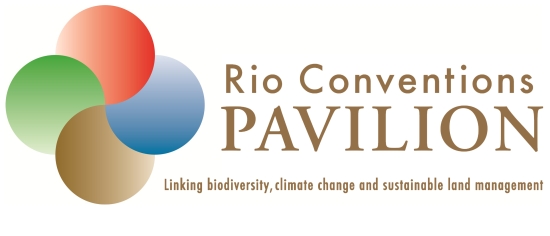Summary of proceedings for Rio Conventions Pavilion UNCCD COP 12 - 16 October 2015: Gender Day - United Nations Decade for Desert and the Fight against Desertification Inter-agency Taskforce
 Friday, October 16, 2015 at 01:38PM
Friday, October 16, 2015 at 01:38PM From the opening speeches to the closure of the day, the resounding message was that achievement of Land Degradation Neutrality and the Sustainable Development Goals requires the empowerment of women. At the opening, the Executive Secretary to the UNCCD said women are central to sustainable land management and all must be done to empower them. The Ambassador of Finland added, “women are needed as agents of change at all levels and women must have equal rights to be able to act as agents of change.” The Minister of Environment and Tourism of Namibia reiterated his country’s commitment to women’s empowerment. In her inspiring speech, Pervin Sarvan, a Yoruk woman from Turkey, passionately reminded all of what is at stake.
Following the keynotes, a panel organised by FAO explored the current and changing situation for women and land rights. Research from the University of Greenwich showed the need for context-specific policies that recognise women’s rights. Capacity-strengthening for women and women leaders is also needed for men and local authorities in order to change perceptions. IFAD showed that rights and arrangements are different across spaces and times, implying that policy development should reflect and build on local successes rather than being prescribed from above. There is still a need for a systematic analysis of success factors however. A presentation on the experience in India of working with over 2 million women to develop an entrepreneurial culture showed business skills development is an important way to empower women and assist in securing land rights. FAO outlined their indicator development project for gender and rights in the context of the SDGs. Legal, ownership and agricultural information is being collected, but gaps exist for sex disaggregated data.
The next discussion organised by UNDP- and WOCAN- concerned “Women and Resilience to Climate Change,” and showed the important role of women in managing drylands resources as they provide for their families’ livelihoods in the face of a changing climate. The concept of resilience helps us understand how people can recover from shocks in the short term and live sustainably in the long term. Social and environmental change are distinct and should not be conflated. To build women’s resilience, we need to strengthen customary institutions while challenging constraining social norms. There is a need for better representation of women in decision making and better distribution of resources and outcomes. Gender justice should be pursued in an interlinked way. A review of UNDP projects in Morocco and Tunisia showed the value of mainstreaming gender into projects and increasing the voice of women. These were good examples of the policy/practice interface that can advance women’s empowerment in drylands, but it takes time to produce results.
After lunch, Land Degradation Neutrality was reviewed through the lens of gender. A UNEP review of gender in the Rio Conventions recommended building capacity at the secretariats –gender plans for the secretariats themselves, appointment of sufficiently-resourced senior programme officers and the development of a joint gender plan of action. The benefits of the latter include reducing reporting burden for Parties and systematic capacity building for secretariat staff and national focal points. IUCN’s experience in developing a gender analysis tool and deploying it for project development and implementation showed its value. Lessons learned from projects in Jordan and India included the importance of adapting methodologies to fit local context. A review of women’s involvement in a watershed programme in India showed that employing women as facilitators and social mobilizers had benefits. Leadership development of women was also developed. Women’s empowerment is a long process, but it must be sustained to produce results.
A dialogue panel with representatives from the UN system, local organizations, research institutions and civil society looked at the active involvement of women in decision-making. Participants suggested strengthening women’s voices in policy processes at all levels. Institutional barriers and practical requirements currently prevent women’s participation and leadership; therefore, changing behaviour will require capacity-strengthening for both women and for men. There is also need to strengthen the policy framework for women in governance. Decentralized governance offers an opportunity to do this, but sensitivity to context and existing political structures is key, particularly in rural areas. Development funding needs mechanisms to ensure that resources go to women.
Sakhile Koketso of the CBD secretariat led a wrap up session of the day that looked at the ways that the panels discussed policy, institutions and capacity-building.
The Minister of Environment and Tourism of Namibia closed the meeting and thanked the participants for their hard work. He indicated that he would be honoured if we continued the work begun at COP-11 beyond today, not only as a legacy, but also to uplift women around the world.

